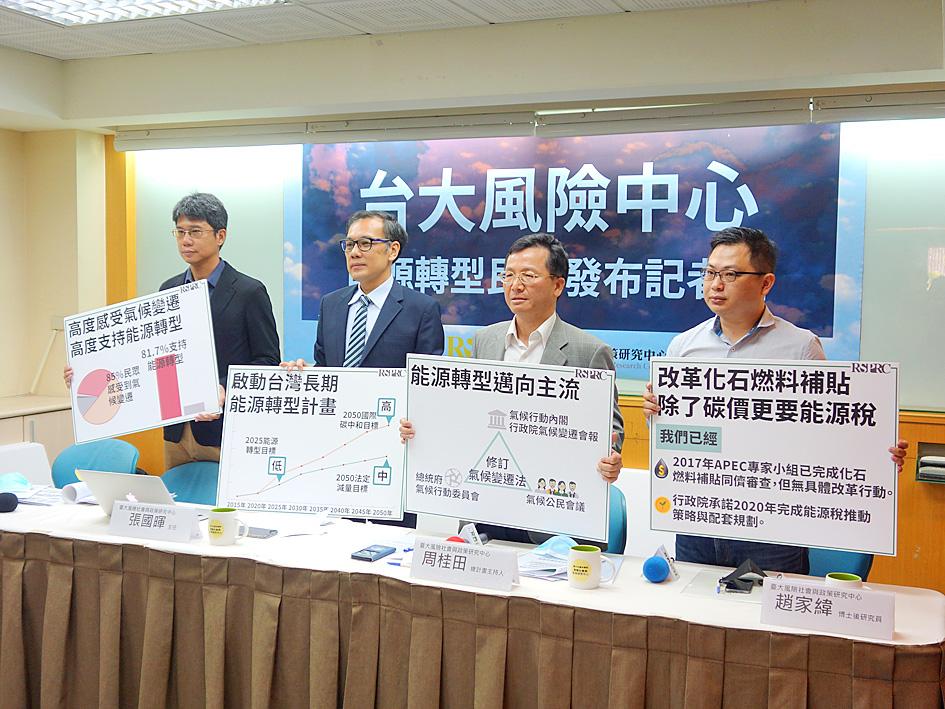More than half of respondents in a survey said that they could accept electricity and fuel price hikes to promote energy reform or collect a carbon tax, National Taiwan University’s Risk Society and Policy Research Center said yesterday.
The center said it released the survey to push President Tsai Ing-wen (蔡英文), who is to begin her second term on Wednesday next week, to expedite energy reform.
The Tsai administration vowed to promote energy transformation by phasing out nuclear energy, while having 20 percent of the nation’s power generated from renewable sources, 30 percent from coal-fired power and 50 percent from natural gas by 2025.

Photo: Wu Po-hsuan, Taipei Times
As of last year, 13.4 percent of the nation’s power was generated from nuclear energy, 6 percent from renewables, 79.2 percent from fossil fuels and the remainder from pumped-storage hydroelectricity, Taiwan Power Co’s Web site showed.
At a news conference in Taipei, the center said 78.5 percent of respondents to its survey agreed with the government’s energy policy, while 12.1 percent disagreed.
Asked if they would support increasing electricity prices from an average of NT$2.6 per kilowatt-hour (kWh) for energy reform, 62 percent said yes and 18.8 percent said no, while 19.2 percent said they had no opinion.
If the price hike is to happen by 2025, 26.6 percent said they could accept a price of NT$2.7 to NT$3 per kWh; 11.5 percent accepted NT$3.1 to NT$3.5 per kWh; 11.3 percent accepted NT$3.6 to NT$4 per kWh; 1.4 percent accepted NT$4.1 to NT$4.5 per kWh; and 11.2 percent accepted a price of more than NT$4.6 per kWh, the poll showed.
The Ministry of Economic Affairs has estimated that average electricity prices would rise to between NT$3.08 and NT$3.39 per kWh by 2025 under current energy policy and fuel costs, center postdoctoral fellow Chao Chia-wei (趙家緯) said.
Compared with the center’s survey in 2018, the number of people who said they could accept an electricity price of more than NT$3.1 per kWh has increased by 7 percentage points, he said.
Electricity prices should better reflect their external costs, he added.
Asked why they would support an electricity price hike, 57.8 percent said to improve air quality.
The poll found that 56.7 percent of respondents could accept a rise in fuel prices due to a carbon tax, among whom 34.3 said they would accept a rise of more than NT$3 per liter.
While the nation’s COVID-19 situation is easing, the government should seize the opportunity to expedite energy reform, such as requiring returning businesses to propose carbon reduction plans, center lead principal investigator Chou Kuei-tien (周桂田) said.
The Executive Yuan should establish a climate change task force to proactively plan the nation’s climate action and energy transformation road maps, with the goal of becoming a carbon-neutral society by 2050, he said.
The poll, conducted from April 6 to 10, collected 1,087 valid samples by telephone, including 785 home numbers and 302 mobile numbers. It has a confidence level of 95 percent and a margin of error of 2.97 percentage points, the center said.
The subhead has been amended since it was first published.

The manufacture of the remaining 28 M1A2T Abrams tanks Taiwan purchased from the US has recently been completed, and they are expected to be delivered within the next one to two months, a source said yesterday. The Ministry of National Defense is arranging cargo ships to transport the tanks to Taiwan as soon as possible, said the source, who is familiar with the matter. The estimated arrival time ranges from late this month to early next month, the source said. The 28 Abrams tanks make up the third and final batch of a total of 108 tanks, valued at about NT$40.5 billion

Two Taiwanese prosecutors were questioned by Chinese security personnel at their hotel during a trip to China’s Henan Province this month, the Mainland Affairs Council (MAC) said yesterday. The officers had personal information on the prosecutors, including “when they were assigned to their posts, their work locations and job titles,” MAC Deputy Minister and spokesman Liang Wen-chieh (梁文傑) said. On top of asking about their agencies and positions, the officers also questioned the prosecutors about the Cross-Strait Joint Crime-Fighting and Judicial Mutual Assistance Agreement, a pact that serves as the framework for Taiwan-China cooperation on combating crime and providing judicial assistance, Liang

A group from the Taiwanese Designers in Australia association yesterday represented Taiwan at the Midsumma Pride March in Melbourne. The march, held in the St. Kilda suburb, is the city’s largest LGBTQIA+ parade and the flagship event of the annual Midsumma Festival. It attracted more than 45,000 spectators who supported the 400 groups and 10,000 marchers that participated this year, the association said. Taiwanese Designers said they organized a team to march for Taiwan this year, joining politicians, government agencies, professionals and community organizations in showing support for LGBTQIA+ people and diverse communities. As the first country in Asia to legalize same-sex

MOTIVES QUESTIONED The PLA considers Xi’s policies toward Taiwan to be driven by personal considerations rather than military assessment, the Epoch Times reports Chinese President Xi Jinping’s (習近平) latest purge of the Chinese People’s Liberation Army (PLA) leadership might have been prompted by the military’s opposition to plans of invading Taiwan, the Epoch Times said. The Chinese military opposes waging war against Taiwan by a large consensus, putting it at odds with Xi’s vision, the Falun Gong-affiliated daily said in a report on Thursday, citing anonymous sources with insight into the PLA’s inner workings. The opposition is not the opinion of a few generals, but a widely shared view among the PLA cadre, the Epoch Times cited them as saying. “Chinese forces know full well that